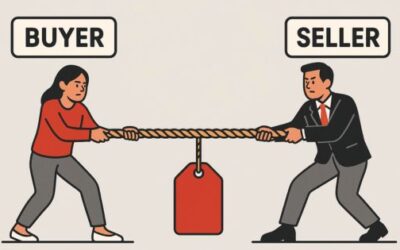Welcome to Mavens of Modern Sales, where we take a deep dive with the sales leaders pulling sales teams in the 21st century to get their insights on leadership, strategy, industry trends, and more.
This week we talked to Elizabeth Andrew, TEDx Speaker and CEO & Founder of Elizabeth Andrew Consulting.
A couple weeks ago you mentioned that the “biggest & most expensive mistake early stage founders make typically lies in their early sales hires.” Do you have specific traits you look for in the early sales hires?
Absolutely, and I think most founders and VCs would agree with this. Going from founder-led sales to scaling a sales organization is unquestionably the hardest thing to get right.
Typically, founders either hire someone too senior, too early – such as a VP of Sales – and burn through funds before they’re ready, they hire by prioritizing impressive resumes from successful established companies over startup-specific skills, or they hire someone who has absolutely no idea what they’re doing and hope they’re “closers”.
Key traits founders should look for:
- Versatility: Ability to handle multiple sales functions, not just closers
- Builder mentality: Excited about creating processes from scratch
- Resilience: Can handle frequent rejections and setbacks
- Learning agility: Adapts quickly to evolving products and markets
- Coachability: Open to feedback and continuous improvement
- Self-starter attitude: Proactively generates leads and opportunities
- Data-driven mindset: Uses metrics to inform strategy and improve
- Storytelling ability: Can articulate the vision and potential of early-stage products
Focus on finding adaptable, hungry individuals who thrive in building something new, rather than “superstar closers” from large corporations. The right fit for a startup environment will ultimately drive more value than impressive past performance in established companies.
In 2024, I’d err on the side of hiring the less experienced closer full time, and supplementing with an experienced consultant (experienced fractional VP of Sales) to create the infrastructure and to coach the full time hire into becoming the organization’s sales leader.
Founders: Just be wary, in this market, everyone is a “fractional” this or that….make sure you’re contracting someone who’s successfully done the job.
I will add, as a sales leader, advisor, and consultant, I won’t work with any founders who haven’t sold at least a few deals on their own. No one is going to be more passionate about a product than the founder and If they can’t close a deal, no one can.
You mentioned back on your journey into tech sales you dealt with some imposter syndrome, being a 40 something single mom on a sales floor full of “SaaS sales dudes”. What steps did you take to stay true to yourself? Did you have a daily mantra or something similar to keep you grounded when that anxiety got high?
To quote Taylor Swift, “you gotta fake it ‘til you make it and I did”!
I have a lot of stories to share on this front – nothing about my colleagues or the culture – but simply the things I had to do to “blend in” in order to secure a job in the San Francisco tech world – in my late 40s, with no tech experience, after 17 years as a Connecticut stay-at-home mom – and the gazillion rejections it took to get just one opportunity. I’m working on a book. 🙂
In a nutshell, it’s the analogy by Michael Caine of “be a duck, remain calm on the surface and paddle like hell underneath”.
Mindset is everything. I went all in on the mantras and self-talk, going as far as having post-it notes around my home reminding me that I’ve ‘got this’, following motivational thought leaders, and shutting out any doubts. One of my teenagers would drive me to the BART station every morning and I’d say, “today is the first day of the rest of your life”, “let’s get it”, and “go be great”…which *always* resulted in eye-rolls and heavy sighs.
I also focused on becoming a student of my profession and learning as much as I possibly could to become an expert in my field.
Hope is not a strategy. You’ve got to do the work.
We’ve heard outbound is all in the messaging, you suggested sellers ask themselves “would I respond to this?” As someone in your position, what typically catches your eye in a subject line or email that elicits a response?
Great question – specifically asking “what catches your eye?”. This is absolutely critical to uncover when creating effective outbound messaging. Here’s the thing….it doesn’t matter what catches my eye.
The key is to ask yourself, who is your ICP (ideal customer profile) and what matters the most to them?
This will vary a lot depending on who it is you’re targeting in your outreach. Put yourself in their shoes and understand their pain points. Speak their language. What are they trying to solve? What is their job performance being evaluated on?
The tone of your subject line needs to resonate with your buyer. If you’re calling on a persona in an innovative software company, you will grab their attention with pithy, clever, trendy messaging – whereas more conventional verticals require more professional messaging.
I always suggest sellers ask themselves, “would I respond to this?” before hitting send.
But I also always advise finding the stakeholder (ICP) within your own organization and interview them to find out what matters most to them. As a sales leader, I regularly bring that person into sales team meetings to educate the entire team, but top-performers typically take it upon themselves to understand their buyer.
For example, when I was an individual contributor selling APIs to software engineers, I learned quickly that engineers are typically ‘allergic’ to salespeople. I asked our company CTO to forward every marketing email that he received and actually read directly to me, so that I could evaluate it and learn.
Once sellers develop effective messaging, they should utilize A/B testing to uncover the best response rates.
Early this year you said the “primary responsibility of a CEO is to create an environment where people can thrive” how would you define this environment? What are the 3-4 absolute musts for you when building this sort of environment?
An environment where people thrive is a workplace where employees feel motivated, supported, and empowered to do their best work – and it’s only possible to create this type of culture top-down.
These are the absolute musts for building this sort of environment:
- Psychological Safety: This means fostering a culture where team members feel safe to take risks, voice their opinions, and make mistakes without fear of negative consequences. It encourages innovation, open communication, and continuous learning.
- Clear Vision and Purpose: We all thrive when we understand and connect with the organization’s vision and purpose. Leaders should articulate a compelling vision and help team members see how their work contributes to broader organizational goals. This gives people a sense of meaning and motivation.
- Growth and Development Opportunities: A thriving environment provides ample opportunities for both personal and professional growth. This includes offering training programs, mentorship, challenging assignments, and *clear career progression paths*. When employees see a future for themselves within the organization, they’re more likely to be engaged and committed.
- Inclusive and Diverse Culture: Research shows workplaces where all individuals, regardless of their background, feel respected, heard, and have equal opportunities to contribute and succeed, experience higher employee engagement, creativity, innovation – and ultimately outperform non-diverse cultures due to the benefits of different perspectives.
These things work together to create an environment where employees feel valued, motivated, and empowered to do their best work and grow both personally and professionally.
Unfortunately, too many founders don’t prioritize these things. I believe this is the largest contributing factor to why so many people are completely burned out and ‘done’ with corporate life these days, and why we hear so much about people seeking ‘work/life balance’.
But, when founders get it right, work becomes energizing, rewarding, and FUN – it’s *fire & magic*.
We’re seeing a general decline in sales numbers. What are your thoughts on this? What do salespeople seem to be missing?
Yasss, you’re right – we’re seeing some challenging trends in the sales landscape, especially in tech. The decline in sales numbers is concerning but not unexpected given current market conditions.
Here’s what’s contributing to this:
- Economic Uncertainty: The global economic climate in 2024 has been marked by volatility. Many companies are tightening their budgets and postponing major tech investments.
- Shift in Buying Processes: The B2B buying journey has become increasingly complex. Decision-making committees are larger and the sales cycle is longer.
- AI and Automation Impact: With the rapid advancements in AI, many traditional sales tasks are being automated.
- Digital Fatigue: After years of remote work and digital interactions, many buyers are overwhelmed and experiencing digital fatigue.
For anyone who started a career after 2010, this post-pandemic era is the first time they’ve truly experienced a down market. It’s humbling to say the least, and at times feels like it’s never going to get better. Trust me, I get it.
As the saying goes, “rising tides lifts all boats”, but I also believe it’s when the tide goes out that separates the boats that can float.
I learned (in the 1980s) that we often experience our greatest personal growth following times of struggle. I started my career in investment sales when Black Monday hit, the largest one-day decline in stock market history. There were some tough years following that, but the hard times enabled me to separate myself from the pack.
Think about it. Some prominent tech companies emerged or significantly grew during the worst part of the Great Recession including: Airbnb, WhatsApp, Square, Slack, Rent the Runway, and Netflix; all capitalizing on the changing market dynamics and consumer needs during that period.
If you’re smart and resourceful – and think outside the box – you can use these times to gain traction in your sales career too.
What salespeople seem to be missing, and what I’d be doing to set myself apart as a seller today:
- Adapt: Do things differently than you’ve done in the past. For me, this would be meeting customers and prospects *in-person* as much as possible. Network, network, network. Make your sales process HUMAN.
- Forget KYC (know your customer)….BECOME your customer: Put yourself in their shoes. Understanding not just their product, but the customer’s industry and challenges intimately. Know them, know their product, know their pain. If you think you’re struggling, they are too.
- Consult (for your customer): Become trusted advisors who can guide strategic decisions beyond simply solving your customer’s pain.
- Utilize AI: Leverage analytics and AI insights to personalize outreach and predict customer needs, and to do all the things you hate to free up your time. Use AI. If you’re not, you won’t survive. Sorry, not sorry. It’s true.
As leaders, to turn this around, we need to invest in upskilling our sales teams, realigning our sales processes with the current buying journey, and ensuring our sellers are equipped to separate themselves in this new economic climate. Press them to think outside the box and do things differently.
It’s challenging, but with the right approach, we can adapt and thrive in this evolving sales landscape.
Elizabeth Andrew is a top-producing technology CEO and co-founder, 5x sales leader, author, motivational speaker, and TEDx speaker, who has established herself as a leader, motivator, and role model with her inspiring story of career reentry by breaking barriers into the San Francisco technology space – at nearly 50 years old, after a 17-year career break.



0 Comments